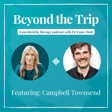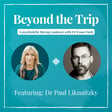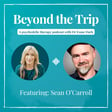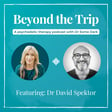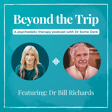
Lucine Eusani: Internal Family Systems and Psychedelic Assisted Psychotherapy
In this episode Im joined by Lucine Eusani, Lucine is an Embodiment Facilitator, Internal Family Systems (IFS) Therapist and Psychedelic Integration Specialist.
We both draw on IFS a lot in our work and share our respective journeys with combining this approach with psychedelic work. We discuss our different pathways into this work, explore parallels between different somatic approaches such as 5 rhythms and psychedelic therapy, outline some key concept from internal family systems and share a little about how this work has impacted us personally.
Lucine originally trained as a mediator, with an MA and Mphil in Conflict Resolution, Lucine spent a decade in South America working in mediation, facilitating of conflict resolution trainings, offering trauma informed yoga, and studying indigenous Amazonian shamanic traditions. With 2 decades as a trauma informed embodiment facilitator, she also became a 5Rhythms teacher in 2015. Lucine is trained in Internal Family Systems therapy (Level 1 and 2), as well as Somatic IFS for individuals and Intimacy from the Inside Out (IFIO) for couples who want to work with their parts in relationship.
Her 1:1 work is somatically guided and trauma informed, embedded in a deep respect for traditional plant medicines and embodied healing practices, and firmly grounded in the IFS therapeutic model. Lucine currently offers consultancy with training therapists for clinical trials in psychedelic therapy, as well as a 1:1 therapy practice specialising in Somatic IFS and IFS groupwork workshops.
Find Lucine at : www.lucineeusani.com
keep in touch with me at Insta: dresmedark
Linkedin: www.linkedin.com/in/dr-esme-dark-627156a0/
website: https://www.esmedarkpsychology.com.au/
Find Monash Clinical Psychedelic Lab at www.monash.edu/psychedelics



